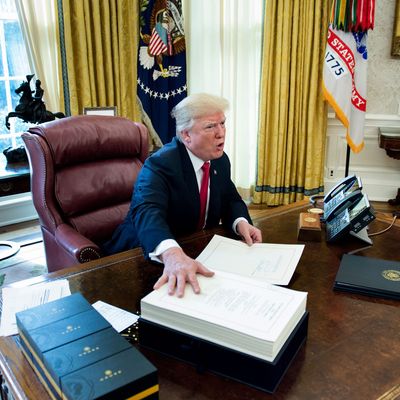
The neoclassical economists of the late 19th and early 20th century believed the government should always balance its budget. Eventually, they mostly gave way to the theories of John Maynard Keynes, who argued that the government should deliberately run deficits during recessions. The modern Republican Party has pioneered a completely novel theory: Governments should balance their budgets when run by Democrats, and run extremely large deficits when run by Republicans.
The new projections by the Congressional Budget Office, the first federal budget analysis to be released since the Trump tax cuts were passed into law, shows how fully the Republican government has operationalized its theory. CBO now estimates the 2018 deficit will be $242 billion higher than it had estimated last June, before the tax cuts. And the tax cut is the major reason: “Accounting for most of that difference is a $194 billion reduction in projected revenues, mainly because the 2017 tax act is expected to reduce collections of individual and corporate income taxes.”
The deficit is expected to grow to more than 5 percent of gross domestic product. That would make sense if the country was spending to counteract a serious but temporary emergency, like a recession or perhaps a major war. There is no such emergency, though.
What’s more, as CBO explains, its figures very likely underestimate the size of the deficit. CBO is required to calculate the effects of the laws as written. That scenario is fanciful. CBO assumes deep cuts to discretionary spending will take place. Discretionary spending is a catch-all category of spending programs that aren’t automatically doled out. It includes defense, infrastructure, medical research, and many other things — most of what government does other than writing checks to retirees and the poor. Neither party actually wants to implement deep cuts to these programs, which is why they agreed once again a few weeks ago to disregard the cuts and maintain those programs.
CBO also assumes the middle class will face significant tax increases toward the end of the decade. The Trump tax cuts were designed with permanent cuts for corporations and heirs of large estates, coupled with temporary, expiring tax cuts for the middle class. They did this because the $1.5 trillion budget limit did not allow them enough money to cut all the taxes they wanted to cut. The political theory behind this combination was that Republicans needed to take advantage of their full control of government to pass the tax cuts Democrats opposed, which exclusively benefit the very rich. They could allow the middle-class tax cuts to expire, assuming Democrats would go along with extending them at some point later on. That is to say, the Trump tax cuts were always intended to cost more than their $1.5 trillion list price.
CBO notes in its report that, if realistic assumptions are made about both these categories, then the fiscal picture would grow even worse: The deficit would consume 6.3 percent of the economy from 2023 to 2028, and rise to 7.1 percent of GDP by 2028. If your deficit is growing at two to three times the rate of the economy, you are running into a dangerous situation, which could become a crisis if an expensive event takes place. (CBO is not predicting when the next recession will take place, but when it does, the budget picture will go south quickly.)
Republicans treated deficits of this scale as dangerous portents of civilizational collapse during Barack Obama’s first term, when the economy was recovering from the greatest financial crisis in three-quarters of a century. Now they are perfectly comfortable jacking the deficit back up to recession-crisis levels, merely because they want to hand out tax cuts to owners of wealth while increasing defense, and without forcing their constituents to bear the cost of the necessary trade-offs.
The official conservative party line during the Reagan era, when Republicans introduced the modern phenomenon of the large structural deficit, was that it was necessary to run the red ink in order to win the Cold War. Then, under George W. Bush, the response to the 9/11 attacks became the new rationale: don’t ya know there’s a war on terror? Notably, and in keeping with the anti-intellectual spirit of the times, conservatives have not even bothered formulating a rationale for increasing the deficit during the peak of an economic expansion. They’re doing it for the same reason they’re undertaking every other abuse of power during the Trump era: because they can.






























